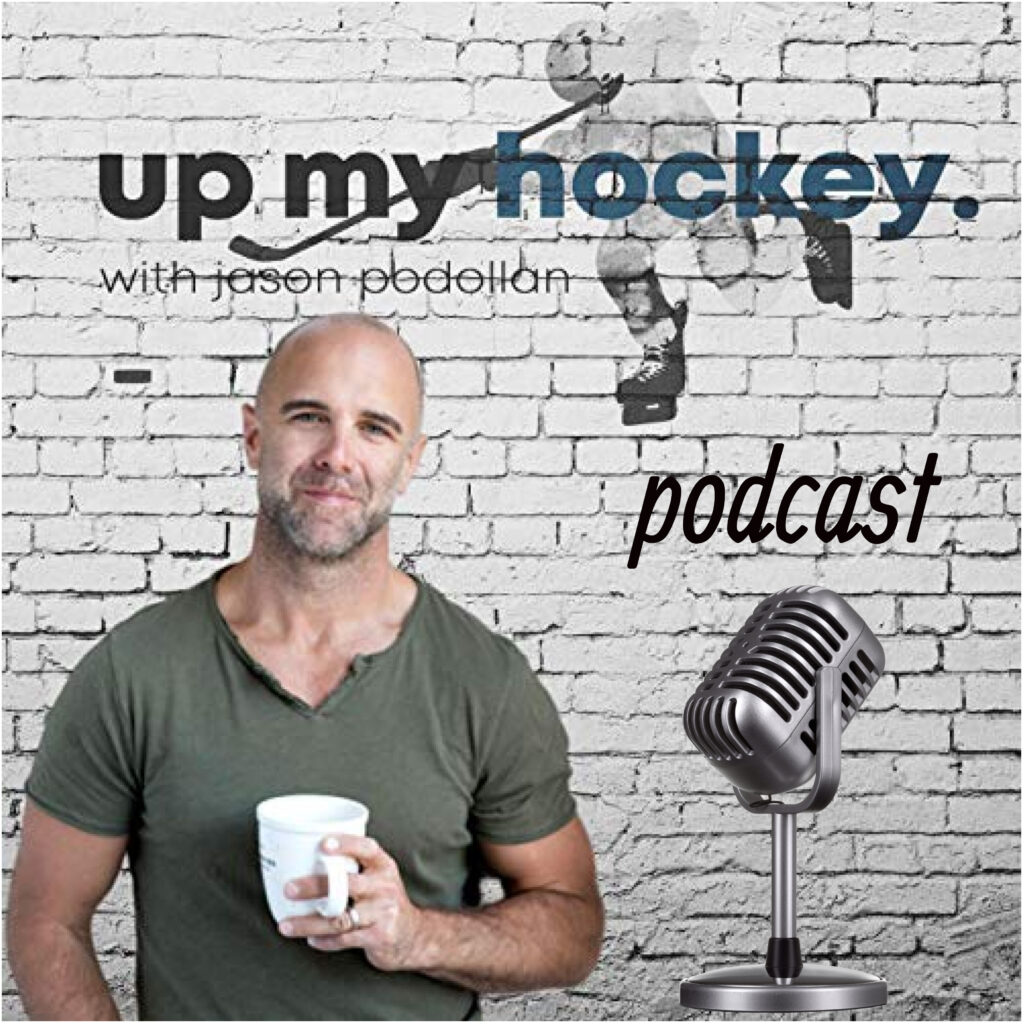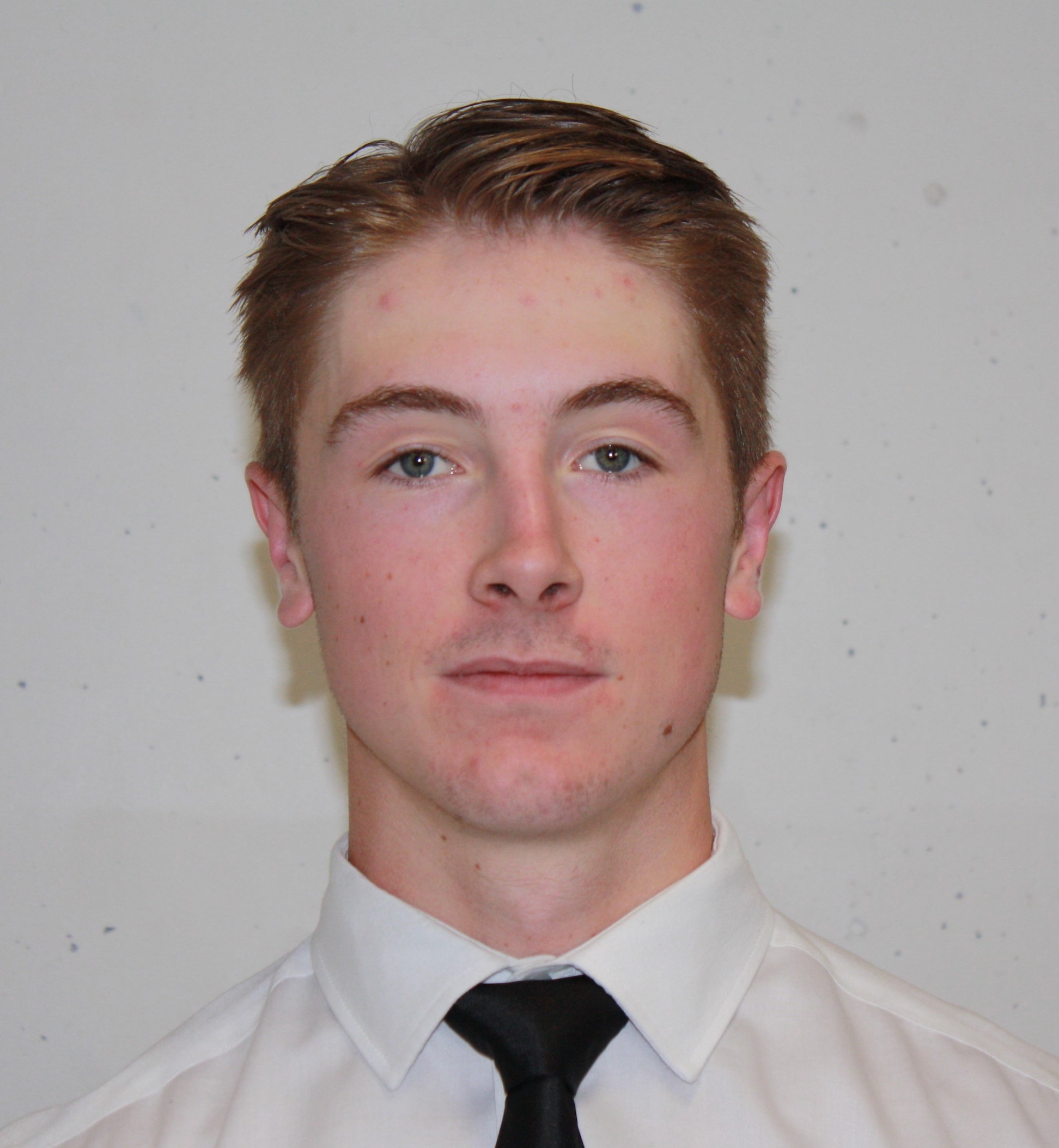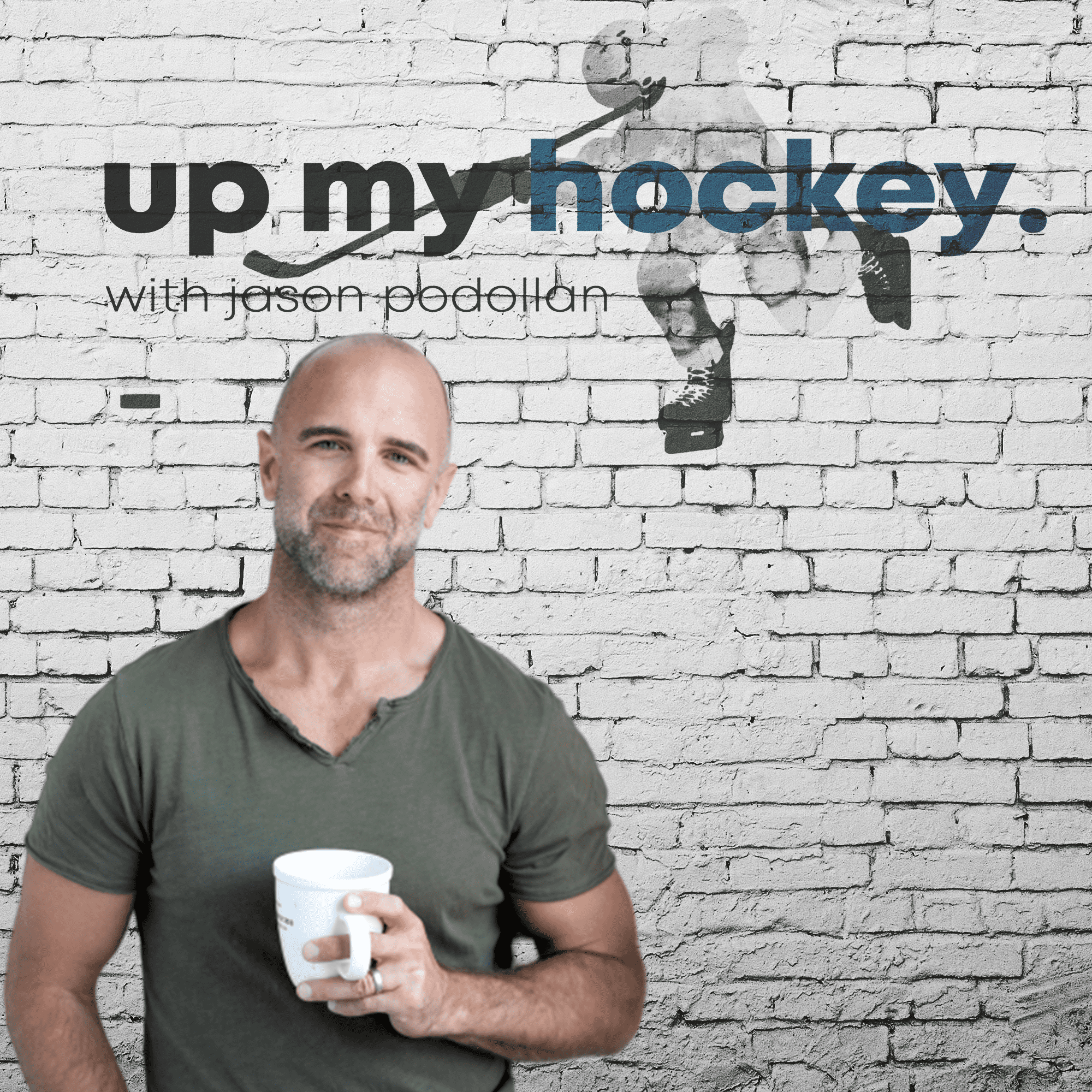
Listen To The Up My Hockey Podcast
with Jason Podollan
- Life and hockey lessons from the pros
- In depth insights into mindset and performance
- Interviews with coaches, scouts and agents
- Available on all major platforms

SPOTLIGHT PODCASTS
Growing up in a very competitive family, with his father, CHL Hall Of Famer, Willard Reaves, and his brother Jordan, who also became a professional football player, Ryan said his dad never let him win and all his victories were definitely earned.
Ryan said there were no participation trophies in his house, growing up, and he takes the same approach to raising his own kids. He makes no apologies for his stance on this and says “If my son comes home with a participation ribbon, it goes in the garbage”.
Every member on a team has a role. Ryan may not be a finesse player, or a 30+ goal scorer, but he has experienced a very long career, that is still going, because he has solidified his role as an enforcer and believes players like him will always be needed, no matter how much they try to take fighting out of the game, because players like Reaves hold others accountable for the their violent actions on the ice.
CFL Hall of Famer, and father of two professional athletes, Willard Reaves, talks to Jason about raising resilient kids, and the mindset he instilled in his boys, CFL player Jordan, and NHL player Ryan.
Willard says he was never easy on his boys, and said it didn’t matter how big he was, he wasn’t going to let them win against him, and they were going to have to earn their victories, because in life, “nobody is going to let you win”.
Willard talks about his service to his community, as a member of law enforcement, and how he always knew he wanted to serve and give back to the community, and why, as a native of Arizona, he chose to stay in Winnipeg, and raise his kids there.
Jason and Willard talk about the personal standard Willard set for himself and for his children, and they touch on the topic of racism. Willard discusses not just having a voice, but how he chose to use his voice.
Laugh along, as you listen to Willard explain how getting down the hallway in the Reaves’ home was its own lesson in resiliency.
Enjoy!
But what if your weakness is something you can’t control, like your height? Your mindset becomes the most important part of your game.
Dean McAmmond was listed with the Prince Albert Raiders as a 13 year old, and after playing 4 years in the WHL he was drafted in the first round, 22nd overall, by the Chicago Blackhawks in the 1991 NHL draft. He played 996 games in his professional career as what (back then) would be considered a smaller player, and talks about how the game has changed since he played, and important areas of the game a smaller player needs to focus on.
Dean and Jason discuss the hockey term known as having a strong “engine” and the importance of not stifling the “fighter” that is naturally within each male.
Dean and Jason talk about how a person’s faith gives them a feeling of calmness and reassurance through difficult times, though Dean makes clear “God is not a Genie in a bottle” to give you a competitive advantage.
Mackie is the current captain of the Salmon Arm Silverbacks and committed to Michigan State, but was 16 at the time of the interview and was looking forward to his rookie season in Salmon Arm. We speak about our work together during the interview.
Chris Joseph was a teammate of mine in Mannhiem, and one of the best people you could meet. Tragically he is also the father of Jaxon Joseph, one of Humboldt Broncos who perished in the awful bus crash that shook us all. Chris shares his memories of Jaxon on the episode. So heart wrenching.
Cristobal Huet, was also a Mannhiem teammate. He was a star NHL goaltender and the most fierce practice competitor I ever faced. Cristobal grew up playing hockey in France and his story is very cool.
Enjoy
Before I go any further, the above statement is a HUGE honor,
When you have earned the respect of your locker room you have succeeded as a hockey player.
Ask Brendan Shanahan or Steve Yzerman, or Chris Osgood about what Brent Gilchrist provided the Detroit Red Wings during their run to become Stanley Cup Champions in 1998 and they will tell you…
Guts…
Character…
Sacrifice…
Brent Gilchrist put the team first and played through incredible pain and agonizing injections to wear the Red Wing jersey, until he tore his groin from the bone.
He made every Red Wing taller, stronger, and more resilient from his example.
Gilchrist shares where he learned why the team comes first, and why it matters.
Enjoy my conversation with 15 year NHL veteran, Brent Gilchrist.
- 154 points in 58 games for the Granby Bisons in 86-87
- 1st overall in the 1987 NHL Entry Draft
- Gold medal with Team Canada at the World Junior Championships in 1987 during the “Punch-up in Piestany”
- NHL All-Star 5 times
- Lady Byng Trophy winner
- 515 Career Goals
- 1327 Career Points
- 97 Career Playoff Points
- Captain of the Montreal Canadiens
- Asst. Captain of the St. Louis Blues
We talk hockey, we talk about development, the mindset of goal scoring, who his best coach was, how to recover from mistakes, when they turned out the lights during the brawl against the Russians, his Hall of Fame status and much, much more!!!
Enjoy the conversation!
It was impossible not to be.
How do you not notice the Sutter’s when 6 brothers ALL played in the NHL at the SAME TIME for 5 seasons!
But if you are a younger player or new to the game, you may not know the amazing story and you NEED to know the story.
Hailing from a farm outside of Viking, Alberta with a population of about 1000, Duane Sutter was the middle brother of 7.
The 17th Overall selection of the New York Islanders in the 1979 Entry draft, Duane Sutter joined the team part way through the 79-80 season and never looked back.
4 years later, Duane had 4 Stanley Cup rings and was a major piece of one of the greatest dynasties in NHL history.
Duane played over 700 NHL games, collected 342 points and amassed 1333 career penalty minutes.
After his playing career was finished he joined the coaching ranks and that was where our paths crossed. Duane was the assistant coach for the Florida Panthers in my rookie NHL pro season.
Enjoy the conversation with Duane Sutter!
Nathan is currently playing in the midget AAA league and has signed a letter of intent with the B.C.H.L’s Salmon Arm Silverbacks.
What amazes me about Nathan is watching his growth over the past 6 months, and seeing how he has grown as a person and as a hockey player by working on certain skills that most athletes simply are not training.
Let me explain.
About 6 months ago Nathan became one of my personal clients in the up my hockey coaching program.
About a month into working together Nathan thought he was going to play a year of midget AA because he was told he was not good enough to play on the AAA team. Deep down he knew he was more than capable of playing on that team.
In this interview we go over what Nathan did in a 6 month span that took him from being “not good enough” for midget AAA, to signing a letter of intent with a top notch Junior A team in the B.C.H.L.
And I’ll give you a hint, it was not simply, work harder or lift more weights in the gym.
Enjoy this interview with my friend and client, Nathan Mackie.
He loved the battle areas – in front of the net, in the corners, and at the lines. Every time May had the opportunity to use his will against his opponent he would rise to the challenge. Many times in Brad’s 1000 game career, that challenge also meant dropping the gloves. Brad it loved every time.
Many players will say (even the heavyweight enforcers), that they didn’t like to fight. That it messed with their heads and the anxiety it caused was mentally exhausting. Brad doesn’t feel that way – he LOVED it. In fact he says that is one of the things he misses most about not playing – he can’t fight.
However, May was much more than a fighter. He was a great teammate, always a fan favorite and an ambassador of the game where ever he played.
He also scored some big goals.
Brad May scored 131 goals in his career, but none was more memorable for hockey fans than the one scored on April 24th, 1993.
May was playing for the Buffalo Sabres and they were deadlocked in overtime against the heavily favored Boston Bruins. It was the first round of the Stanley Cup playoffs, and the Sabres had miraculously won the first 3 games. They needed one more to end it. They couldn’t give the Bruins any life.
And Brad May ended any hopes of a comeback. May received a pass cutting through the neutral zone from Sabre legend, Pat LaFontaine. Brad beat Bruins Hall of Famer, Ray Bourque 1 on 1, put a sick move on the tender, Andy Moog, and ended it.
The goal was beautiful and important, but the call by Rick Jeanneret was what made it even more special. Jeanneret screamed “Mayday!” again and again after Brad scored and the entire scene will be forever etched in our minds.
And with one goal, “Mayday” become his nickname for life.
Mayday is a very charismatic guy with tons of stories. We revisit the famous goal, but we also talk about his humble beginnings to first round draft pick, the grind of establishing himself as an NHL regular, and the Stanley Cup with the Ducks in 2007.
Terry was a child prodigy when it came to hockey. He grew early, he understood the game, he could finish, and at 14 years old – he also found out he could fight.
Being a child star comes with a lot of pressures. Some just and some unjust, but you have to learn to navigate them either way and Terry discusses how he learned to manage and the steps his family took to provide the best opportunity for him.
Ryan went on to a WHL career that included a 50 goal season as a 17 year-old with the Tri-City Americans, which earned him an 8th overall selection to the Montreal Canadians in the 1995 NHL Entry Draft.
Along with a big signing bonus came big expectations and Terry was ready to tackle the NHL, but a change in management with the Canadians came with new bosses who didn’t see him in quite the same lens.
Terry ran into problems with his coach, Michel Therrien, in the AHL and he couldn’t find his way out of the doghouse. Terry ended up losing his identity as a goal scorer and began fighting more than his 50 goal hands should have been.
We reflect on Terry’s career. Some things he is proud of and some things he would have changed. But his journey has brought him to where he is today and he is proud of the man and the father he has become. That’s hockey, and that’s life. Keep learning and keep growing.
Thank you Terry for sharing your story. Enjoy the conversation.
If you want to reach out to Terry and get a personalized edition of his second book “Fights, Film, & Folklore” reach out on Instagram @terryryan2020
Rick Vaive loved scoring goals and was wired to compete. His competitive nature and hatred of losing often got him in the penalty box, but it also earned him the Maple Leaf captaincy at 22 years of age. He was the new face of the franchise and it was his team lead. Rick thrived under the spotlight and produced 3 consecutive 50 goal seasons in the 80’s and to this day is still the only player in Maple Leaf history to score 50 goals in a season. The personal success was bittersweet. Unfortunately, the team did not have the success the fans or Rick wanted during this time.
The chaos surrounding a Harold Ballard team, the lack of team success and some personal struggles, meant Vaive’s career was not without controversy. He had the captaincy taken away from him after missing a morning skate and was later traded to the Blackhawks.
We get into some of his career, but I left most of that for those who will read his book. Rick released his autobiography, “Catch 22”, earlier this year, where he chronicles his career and the ups and downs in it.
In this conversation we talk about coaching, parenting, mindset, competitiveness and character… and a lot of other things. I think you will see a side Rick Vaive you haven’t seen before, enjoy.
Willie O’Ree broke the NHL color barrier in 1958, when he suited up with the Boston Bruins for a weekend set against the Montreal Canadians. There were only 6 teams in the league at that point. Only 120 players in the world got to call themselves NHL’ers each season – Willie O’Ree was one of them – he was an NHL’er.
What captivated me most about this discussion was Willie’s personality. He was engaging, contemplative, and sharp, and he’s 85 years young. So many experiences are wrapped up those 85 years and I did my best to try and capture some lessons while we honored the past.
The history of the game is something we should take more pride in as a hockey culture. Understanding those who came before us, their accomplishments and their struggles, can only strengthen our love affair with the sport.
O’Ree had a such a passion for hockey that he overcome great odds and unimaginable adversity to live out his dream and wear an NHL jersey. 21 years of professional hockey to his credit, and he did it all without the use of his right eye! The story gets even better too, but I’ll let you hear it from Willie himself.
Sport is about people, and Willie O’Ree is a person whose story we should all know. We should all have conversations with our players and our children about Willie.
Enjoy my conversation with one of the game’s greatest gentleman, Mr. Willie O’Ree.
He wasn’t drafted in bantam.
He wasn’t drafted by an NHL team either. Twice he was passed over.
But he did play 606 games in the best league in the world.
Smithson went on to play 10 straight seasons in the NHL after breaking through as a 26-year-old with the Nashville Predators.
Some younger athletes might be asking how he did it? Most of them think only the super skilled players that score all the goals and get all the points go on to the glory of the NHL. But that’s just not true, and you see it time and time again.
Smithson played 600 games in the NHL because he embraced a role, and he did it well.
He perfected his face-offs. He played with energy. He hit. He knew how to play defense and be reliable in his own end. His coach could trust him. He killed penalties. He would defend his teammates. He was a good teammate and well-liked in the dressing room.
This is not to say Jerred wasn’t skilled – you must be incredibly good at all aspects of your game to play regular minutes at that level – but Smithson never tried to be something his coach didn’t want him to be. He knew his role and he filled that role with pride and to the best of his ability.
This conversation is filled with lessons. Perseverance. Belief. Passion. Coachability. Accountability. Resilience. I know you’ll enjoy it.
1554 NHL regular season games
81 NHL play-off games
625 career goals
1300 career points
1 Art Ross
2 Rocket Richard’s
2 Memorial Cups
2 Olympic Gold Medals
1 World Championship
1 World Junior Championship
1 win away from a Stanley Cup
Like I said, we could go on and on about what Iggy accomplished on the ice, but Jarome was also a Hall of Famer off the ice.
Character, class, integrity, leadership, and professionalism are all apt adjectives for Jarome. He was a leader of men and also a leader in the community.
For all you hockey players out there who are looking for a role model – on and off the ice – pick Iggy. He treats people right, he’s humble, he’s grateful, he’s gritty and he was a fierce competitor. He is the exact type of person you want to build a franchise around and model your game after.
The Calgary Flames and their fans were blessed to have him for 15 seasons. NHL fans everywhere were blessed to watch him suit up for 20 seasons.
In this interview we discuss the evolution of Jarome Iginla – from player, to star, to captain, to father, to coach.
Enjoy the conversation.
When The Coaches Site reached out to me and asked if I would be a part of their Virtual Coaches Summit this year I was excited and honored. They wanted me to interview an NHL head boss, and I knew exactly who I wanted to reach out to. I played for Bruce with the Lowell Lock Monsters, way back in the 1999-2000 season. He was a rookie coach in the AHL, and I was his leading scorer that year and I thought it would be great to catch up with him. And in typical Bruce Boudreau fashion, he agreed to make the time to talk with me.
That’s Bruce – he has time for people. He has time for his players. He cares about the people around him. And in my opinion, that is what makes him a great coach.
We cover a lot in this conversation. From his playing days and the lessons he learned as a player, to his start in coaching and his journey to the NHL.
The Coaches Site called this interview, “Lessons Learned During a Lifetime of Hockey”, and it is a perfectly accurate title. But I chose to call it, “The Coach You Wished You Played For”, because from a player’s perspective, that’s exactly who he was. He was honest, and straight forward. He was passionate, and he cared. He wasn’t perfect and he was the first to admit it. He was a real person doing the best he could, and that made him respectable and likeable and he earned our trust.
Bruce still coaches the same way. Like any high performer with longevity, he has evolved and grown and become better at his craft, but he is still Bruce. He is still the man that is friendly, warm and honest, and someone you would want to invite over for dinner. He just also happens to have 567 wins in the NHL.
I hope you enjoy my conversation with Bruce Boudreau.
Osgood won 3 Stanley Cups in total, including 2 as a starter in 1998 and 2008. He almost won his fourth Cup during a fantastic run in 2009, but his Red Wings lost game 6 & 7 to the Pittsburgh Penguins to fall 1 goal short.
We discuss a ton of interesting stuff in this 90 minutes like:
- What’s it like to get pulled in your first NHL start
- How to bounce back after making a huge mistake
- The most important aspects of preparation for a goaltender and why they are critical to your confidence
- What it was like to fight is idol Patrick Roy at center ice in the 98 play-offs
- And what player has the best backhand in hockey
- Why mistakes can teach you or they can break you
- And the benefit of being able to consciously choose your response to events
Ozzy was an awesome guest and I hope you enjoy the interview as much as I did.
At the time I was playing for the stacked Sherwood Park Flyers and more than halfway through the season we had not lost a game, but the Toronto Red Wings and Kevin Weekes were the talk of the tournament.
The Toronto Red Wings traveled a long way to be there and we heard they were a powerhouse, but they also had a lightning quick BLACK goalie that drew much of the conversation.
Before the tournament even started, it seemed destined for us to meet in the final, and both teams lived up to the hype. Although I managed to get one past Kevin on a partial breakaway in the second period, it was not enough, and Toronto ended up besting us 4-3. Mr. Weekes and the Red Wings handed us our first loss of the season and they took the tournament title.
Given the current social climate and the BLM movement, this conversation with Kevin provided me the opportunity to revisit the KIBHIT tournament and my personal reaction at 14 years old to Kevin being black. Like many other players from the rural west, I had never competed against a black player to that point. A hockey rink was not a place where I was familiar with seeing people of color.
My acknowledgment and curiosity were innocent and innocuous. Unfortunately for Kevin, that wasn’t always the case.
Kevin drew attention.
The color of Kevin’s skin made him different – so did his athleticism in the net. He was damn good.
People were always watching. Most were supporters, some were detractors, but Kevin knew from an early age that he was ALWAYS auditioning.
This conversation allowed me to contemplate the gravity of what it might have been like to be Kevin Weekes as a hockey player. His experience was unquestionably much different than mine.
Not only did he play the most isolating position in the sport, but he was often the only black player in the locker room.
Years after KIBHIT, Kevin and I got drafted by the Florida Panthers where we became teammates and friends and I got to witness Kevin daily and he earned my respect and my admiration.
Kevin has earned respect throughout our great game from all levels of the sport. He is respected for is reverence and knowledge of the game. For is journeyman 11 year NHL career with 7 different teams and his pivotal contribution to the Carolina Hurricanes run to the 2002 Stanley Cup final. He is respected for being a trailblazer and the first black analyst in the history of the sport and his ability as a broadcaster to connect the fans to the person behind their favorite player. For his dedication and commitment to constantly improve and master his craft. And most importantly, Kevin is respected because he respects EVERYONE he meets. In my opinion Kevin Weekes has a Master’s Degree in what he calls, Human 101.
Given recent events surrounding our game and the events surrounding our country, Kevin has been a rational and experienced voice on the need for change within the game. He is campaigning for greater access, for greater inclusion, and for people of all colors and backgrounds to be welcomed and celebrated within the sport.
Kevin says the NHL should be about putting the best people available in the room and I agree.
And whether you are able to make it to the greatest league in the world, hockey should be a safe place for everyone who plays it at all levels.
Let us take a class in Human 101… please enjoy my conversation with Kevin Weekes.
And that was when Jared Bednar walked over and introduced himself.
Bedsy was 19 and he made me comfortable. He talked to me on the bus, invited me to play cards and hang out with the guys. He made me feel like I was welcomed and that I belonged.
Jared understood that he could make a difference.
Unfortunately, Jared got traded early into the next season. We never kept in touch and he probably never knew the impact he had on me.I never forgot him but I also never had the chance to thank him.
I got the opportunity in this episode.
If you are reading this, you know Jared Bednar is the head coach of the Colorado Avalanche. You probably know he was nominated for the Jack Adams Award as the top coach in the NHL in 2018. You also might know he won a Kelley Cup in the ECHL and the Calder Cup in the AHL as a coach…
…but you might not know what type of person Jared Bednar is.
In this episode of Up My Hockey you get to hear from Jared Bednar the player, the coach, AND the person.
Bedsy is one of the best people you’ll ever have the pleasure of meeting. He is approachable, relaxed, caring, warm and loves a good laugh – traits you might not automatically attribute to a NHL head coach of one the league’s top teams.
I believe that is what makes him great.
He embodies what is right about the new style of coaching in the NHL. He cares about his players because he understands they are people first. As he says in the interview “happy players are better players.” He wants his team to be happy.
Sounds simple doesn’t it?
The NHL is a league about results and often coaches get caught focusing on the wins and losses. But when a coach like Bednar can place emphasis on the well being and growth of the people (players) first, often the results will take care of themselves.
I welcome you to get to know Jared Bednar.
Holland has been around the game of hockey his entire life. Originally a goalie with the Medicine Hat Tigers, Holland was selected 188th overall by the Toronto Maple Leafs in the 1975 NHL entry draft.
Holland went on to play 8 seasons of pro hockey and played 4 games in the NHL – one for the Hartford Whalers, and 3 for the Detroit Red Wings.
After his retirement Ken had a brief job as a door to door vacuum salesman, before landing a job as an area scout for the Red Wings. In 1997 Holland made his ascension up the ranks complete and was named executive Vice President and General Manager.
Ken helped comprise one of the most potent teams of a generation with the Wings. Aided by drafting two cornerstones in Zetterberg and Datsyuk (round 7 and round 6) Holland gained a reputation as one of the most successful general managers in the NHL. Under his leadership as GM the Red Wings won the Central Division ten times, the regular-season Conference title five times, the President’s trophy four times, and the Stanley Cup three times. Holland and the Wings also lost in Stanley Cup final twice during his tenure.
Ken is now just finishing his first season as GM of the Edmonton Oilers and signed a 5 year contract in late spring 2019.
We cover a lot in this episode. Mostly we focus on the draft, and player development and the road to the show. But we do come off the rails a few time and go down some rabbit holes!
I know you will enjoy this one… it’s not often you get an NHL GM to donate 90 minutes of his time!
Enjoy!
To make it as an agent most people think they have to be great at contract negotiations and endorsement deals. Sure these things are tools of the trade, but these skills don’t do you much good if you don’t have any players to represent.
You need to identify and evaluate talent, recruit the talent, and then develop the talent.
That’s where a guy like our guest Joe Oliver comes in. Joe is a partner at KO Sports Inc, a boutique agency that represents the likes of Dylan Larkin, Jacub Trouba, Brandon Dubinsky, and Kyle Turris and Ryan Johansen. Joe and KO Sports is focused on recruiting a small number of high quality players, building strong relationships with the players and their families and supporting their journey and development throughout their careers.
Joe, and his decades of experience in the game and is recognized as one of the top talent scouts in western Canada. Joe is also a “straight forward, handshake, eye contact, go for a beer” kind of guy which makes him likable and good at recruiting. And he is passionate about helping his players develop as people and becoming the best athletes they can be.
This episode is all about the world of player representation and it is a conversation I had a blast with.
Enjoy!

About Jason
Jason Podollan teaches the mindset skills and techniques that have made him a 31st overall draft pick and Gold medal winner for Canada at the World Junior Championships. Once one of the highest rated prospects in North America, Jason foresaw a 1000 game NHL career, but fell short of his dreams in playing only 49. Jason now interviews various hockey involved guests, from coaches, players, ex players, scouts, agents etc. to dissect their experiences in order to help those still playing the game.
Jason Podollan
Join Jasons Up My Hockey Facebook Group Today!
Sign up join a community of incredibly passionate hockey parents today! Learn from each other, and help your kids become the best people and players they can be.



